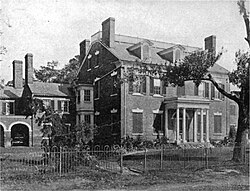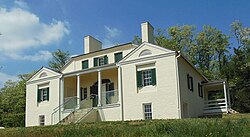Thomson Francis Mason
Thomson Francis Mason | |
|---|---|
| Born | 1785 |
| Died | December 21, 1838 Alexandria, D.C. |
| Nationality | American |
| Alma mater | College of New Jersey |
| Occupation | jurist, lawyer, councilman, judge, and mayor of Alexandria, D.C. |
| Spouse(s) | Elizabeth "Betsey" Clapham Price |
| Children | 9, including Arthur Pendleton Mason |
| Parent(s) | Thomson Mason Sarah McCarty Chichester |
| Relatives | grandson of George Mason IV |
Thomson Francis Mason (1785 – 21 December 1838)[1][2] was a prominent jurist, lawyer, planter, councilman, judge, and the mayor of Alexandria, District of Columbia (now Virginia) between 1827 and 1830.[2]
Early life and education[]
Mason was born in 1785 at his grandfather George Mason's Gunston Hall plantation in Fairfax County, Virginia.[1][2][3][4] He was the second eldest child and eldest son of General Thomson Mason (1759–1820) and his wife Sarah McCarty Chichester.[1][5] Mason was primarily raised at Hollin Hall, his father's plantation.[5][6]
On 24 October 1805, Mason entered the College of New Jersey (now Princeton University) as a member of the junior class.[3] That same year, he joined the American Whig-Cliosophic Society.[3] Mason graduated from Princeton with honors and subsequently stayed to study law.[3] He graduated from law school in 1807 and returned to Virginia.[4][6]
Career[]
Upon his return to Virginia, Mason began practicing law in Fairfax County.[4][6] In 1812, he set up his law practice in Alexandria, which was then located in Alexandria County of the District of Columbia.[3] Mason served as Justice of the Peace in Alexandra three times.[5] Mason played an important role during the 1820s in the fight to retrocede Alexandria County from the District of Columbia to Virginia.[4][6] Because of this, he became increasingly involved in Alexandria's political activities.[4][6] Mason served as mayor of Alexandria between 1827 and 1830.[2][3][4][6] He was elected to the office four times.[4][5] Six months before his death in 1838, President Martin Van Buren appointed Mason as the first judge of the newly organized Criminal Court of the District of Columbia.[3][4][6]
Mason was also involved in several of Alexandria's transportation infrastructure projects.[4] He served as president of and attorney for the Middle Turnpike Company for eleven years until his resignation on 16 July 1838 to accept President Van Buren's judicial appointment.[3][4][6] The Middle Turnpike, now known as the Leesburg Pike (Virginia State Route 7),[7] was completed shortly after his death.[3] As Alexandria's mayor and as chairman of the Alexandria Committee, Mason was involved with the construction of the Alexandria branch of the Chesapeake and Ohio Canal.[3][4] The Alexandria Canal was later completed in 1843.[3]
Marriage and children[]
Mason married Elizabeth "Betsey" Clapham Price of Leesburg, Virginia, on 19 November 1817.[1][2][4][6] He and Elizabeth had ten children, five sons and five daughters:[1][4][8]
- Ann Graham Florence Mason Rhett (died 1883)[1]
- Arthur Mason (died 28 May 1835)[1]
- Sarah Elizabeth Mason Campbell (1819–1907)[1]
- Matilda Eulalia Mason Rhett (February 1821–22 February 1871)[1]
- Thomson Francis Mason (January 1825–9 September 1841)[1]
- John Francis Mason (28 August 1828 – 4 August 1897)[1]
- Virginia Mason Davidge (1 February 1830–December 1919)[1]
- Caroline Betty Mason (9 March 1832 – 1919)[1]
- Arthur Pendleton Mason (11 December 1835 – 22 April 1893)[1]
- Clapham Mason (born circa 1838 - died Nov 16 1844) [9]
Thomson and Betsey's surviving five daughters and three sons attended various schools in Alexandria, where they learned music, drawing, and French in addition to reading and writing.[4] The couple were friends with members of the Lee family, the Washingtons, the Madisons, and other landed gentry.[4] Thomson and Betsey entertained lavishly at their Colross and Huntley estates.[4]
Huntley[]
Upon the death of his grandfather George Mason on 7 October 1792, Mason's father Thomson inherited a portion of the Gunston Hall estate.[10] Around 1817, Mason's father Thomson divided the property into two plantations:[4][10] Dogue Run farm for Mason's younger brother Richard Chichester Mason (1793–1869) and Hunting Creek farm for Mason.[10] On his Hunting Creek tract, Mason constructed his secondary home known as Huntley between 1820 and 1825.[4][6][10] Huntley never served as a permanent residence for Mason who owned a number of houses in Alexandria including Colross, his chief homestead.[4][6]
Mason died on 21 December 1838 in Alexandria at the age of 53.[1][2][3][4][5][6] Originally interred at Colross graveyard in Alexandria, Mason's remains were reinterred at Christ Church Episcopal Cemetery, also in Alexandria.[2] Twenty years after Mason's death, his widow Betsey attempted to sell Huntley and its accompanying Hunting Creek farm in 1859.[6][10] When she was unable to sell the property, Betsey transferred ownership on 7 November 1859 to her sons John "Frank" Francis Mason and Arthur "Pen" Pendleton Mason.[6][10] In 1989, Huntley was acquired by the Fairfax County Park Authority. The main house has been restored and is open for regular tours on Saturdays, April through October, and hosts special programs and events. Renovation of the nearby tenant house was completed in 2017 and it is used as a visitor welcome center for tours and programs.[4]
Relations[]
Thomson Francis Mason was a grandson of George Mason (1725–1792);[1][2] nephew of George Mason V (1753–1796);[1][2] grandnephew of Thomson Mason (1733–1785);[1][2] son of Thomson Mason (1759–1820) and Sarah McCarty Chichester Mason;[1][2] first cousin once removed of Stevens Thomson Mason (1760–1803) and John Thomson Mason (1765–1824);[1][2] second cousin of Armistead Thomson Mason (1787–1819), John Thomson Mason (1787–1850), and John Thomson Mason, Jr. (1815–1873);[1][2] first cousin of George Mason VI (1786–1834), Richard Barnes Mason (1797–1850), and James Murray Mason (1798–1871);[1][2] second cousin once removed of Stevens Thomson Mason (1811–1843);[1][2] and first cousin thrice removed of Charles O'Conor Goolrick.[1][2]
Ancestry[]
| showAncestors of Thomson Francis Mason |
|---|
References[]
- ^ Jump up to: a b c d e f g h i j k l m n o p q r s t u v w x Gunston Hall. "Thomson Francis Mason". Gunston Hall. Archived from the original on 2009-07-23. Retrieved 2009-03-07.
- ^ Jump up to: a b c d e f g h i j k l m n o p The Political Graveyard (June 16, 2008). "Mason family of Virginia". The Political Graveyard. Retrieved 2009-03-07.
- ^ Jump up to: a b c d e f g h i j k l Shirley Scalley. "Thomson Francis Mason 1785-1838". Huntley Meadows Park. Retrieved 2009-03-08.
- ^ Jump up to: a b c d e f g h i j k l m n o p q r s t u Fairfax County Park Authority. "Historic Huntley". Fairfax County Park Authority. Archived from the original on 2009-05-15. Retrieved 2009-03-08.
- ^ Jump up to: a b c d e Alexandria Library (May 2005). "Thomson Mason Papers" (PDF). Alexandria Library. Retrieved 2009-03-08.
- ^ Jump up to: a b c d e f g h i j k l m n Virginia Historic Landmarks Commission Staff (March 1972). "National Register of Historic Places Inventory - Nomination Form: Huntley" (PDF). Virginia Department of Historic Resources. Retrieved 2009-03-08.
- ^ Smithsonian Institution Architectural History and Historic Preservation. "4.0 BACKGROUND RESEARCH". Smithsonian Institution Architectural History and Historic Preservation. Archived from the original on 2012-12-15. Retrieved 2009-03-08.
- ^ Alexandria Gazette November 18, 1844 p.2
- ^ Alexandria Gazette November 18, 1844 p. 2
- ^ Jump up to: a b c d e f Shirley Scalley. "Huntley Meadows Park". Huntley Meadows Park. Retrieved 2009-03-08.
- 1785 births
- 1838 deaths
- 18th-century American Episcopalians
- 19th-century American Episcopalians
- American people of English descent
- American planters
- Businesspeople from Virginia
- District of Columbia judges
- Mason family
- Mayors of Alexandria, Virginia
- Mayors of places in the District of Columbia
- People from Fairfax County, Virginia
- Princeton University alumni
- Virginia lawyers
- Lawyers from Washington, D.C.
- Lawyers from Alexandria, Virginia
- People from Leesburg, Virginia

